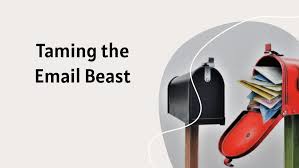Inbox Management: Strategies for a Clutter-Free Email Experience

In today’s fast-paced digital world, managing your email inbox effectively is essential for maintaining productivity and reducing stress. A cluttered inbox can lead to missed messages, increased anxiety, and wasted time. In this blog post, we’ll explore the importance of inbox management and provide you with actionable strategies to keep your inbox organized and efficient.
Why is Inbox Management Important?
- Enhanced Productivity: A well-organized inbox allows you to quickly find important emails, reducing the time spent searching for messages.
- Reduced Stress: A clutter-free inbox can alleviate feelings of overwhelm, helping you focus on what really matters.
- Improved Communication: With effective inbox management, you’re less likely to miss important emails or deadlines, leading to better relationships with colleagues and clients.
- Better Time Management: By organizing your inbox, you can prioritize tasks and manage your time more effectively.
Strategies for Effective Inbox Management
1. Set Up Folders and Labels
Creating folders and labels is one of the most effective ways to categorize your emails. Organize your inbox into specific folders based on projects, clients, or themes. This will help you quickly locate emails when needed.
Example Folders:
- Work
- Clients
- Projects
- Personal
- Follow-Up
2. Use Filters and Rules
Most email clients offer the ability to set up filters or rules that automatically sort incoming emails into designated folders. For instance, you can create a rule that moves all emails from a specific sender directly into a folder, keeping your inbox clear.
3. Unsubscribe from Unnecessary Newsletters
If your inbox is cluttered with newsletters you rarely read, take a moment to unsubscribe from them. Most email clients have an unsubscribe option at the bottom of promotional emails, making it easy to reduce your inbox clutter.
4. Prioritize Your Emails
Use the “Star” or “Flag” feature to mark important emails that require immediate attention. Prioritizing your emails helps you focus on what’s most important and prevents critical messages from getting lost in the shuffle.
5. Adopt the Two-Minute Rule
If you can respond to or take action on an email in two minutes or less, do it immediately. This rule helps you quickly clear small tasks from your inbox and prevents them from piling up.
6. Schedule Regular Inbox Cleanups
Set aside time each week to review and clean your inbox. This includes deleting unnecessary emails, archiving older messages, and reorganizing folders. Regular cleanups prevent clutter from building up and keep your inbox manageable.
7. Utilize Email Management Tools
Consider using email management tools or apps designed to help you organize your inbox. Tools like Clean Email, Unroll.me, or Spark can help you efficiently manage subscriptions, automate organization, and improve your overall email experience.
8. Limit Email Notifications
Constant notifications can lead to distractions and hinder your ability to focus. Consider turning off email notifications for non-essential messages or designating specific times to check your email throughout the day.
Conclusion
Effective inbox management is essential for maintaining productivity and reducing stress in today’s email-driven world. By implementing strategies like creating folders, using filters, prioritizing emails, and regularly cleaning up your inbox, you can enjoy a more organized and efficient email experience. Remember, a well-managed inbox not only enhances your productivity but also improves your overall communication with colleagues and clients.
